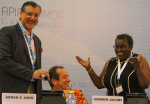 3 September 2014: The Third International Conference on Small Island Developing States (SIDS) continued plenary discussions, which featured statements and announcements of commitments and partnerships. Two multi-stakeholder partnership dialogues took place on: sustainable energy; and oceans, seas and biodiversity. Numerous side events took place through the day and into the evening, including several focused on renewable energy.
3 September 2014: The Third International Conference on Small Island Developing States (SIDS) continued plenary discussions, which featured statements and announcements of commitments and partnerships. Two multi-stakeholder partnership dialogues took place on: sustainable energy; and oceans, seas and biodiversity. Numerous side events took place through the day and into the evening, including several focused on renewable energy.
Country statements in plenary highlighted the importance of: promoting inter- and intra-regional connectivity among SIDS; reconsidering the use of gross domestic product (GDP) as the sole measure of wealth; achieving progress on the Millennium Development Goals (MDGs); addressing water scarcity; and promoting renewable energy and energy efficiency. Many delegates looked ahead to the forthcoming climate discussions in New York, Lima and Paris, while referring to the security aspects of climate threats and the potential of natural disasters to reverse development gains.
Several countries announced SIDS-specific partnerships and financing, including the United Arab Emirates’ (UAE) allocation of US$100 million in concessional financing for renewable energy, and Sweden’s contribution of SEK1.3 billion to the Global Environment Facility (GEF), and a further SEK300 million to the Green Climate Fund (GCF), when fully operationalized. Barbados called for a SIDS-specific financing mechanism to be established within the GEF.
During the Partnership Dialogue on sustainable energy, Andrew Jacobs, EU, highlighted the EU/NZ Energy Access Partnership that is assisting the Pacific region in reducing dependence on fossil fuels, and suggested extending this cooperation to other regions. Naoko Ishii, CEO, GEF, said affordable energy is vital for SIDS’ sustainable development, and recommended that the international community put a price on carbon. Adnan Amin, Director-General, International Renewable Energy Agency (IRENA), announced his organization’s SIDS Lighthouses initiative to support the development of renewables in SIDS and the launch of a biofuel project in Samoa. Christiana Figueres, Executive Secretary, UN Framework Convention on Climate Change (UNFCCC), highlighted opportunities for SIDS in renewable energy, saying islands’ small size and remoteness encourages the incubation of renewable energy technologies and enables price competitiveness with fossil fuels. During discussion, SIDS speakers highlighted renewable energy goals, and other countries highlighted SIDS partnerships. The Marshall Islands said his country powers 95% of outer island communities with solar energy.
At the Partnership Dialogue on oceans, seas and biodiversity, Tommy Remengesau, President, Palau, called for looking beyond the exclusive economic zone (EEZ) approach and adopting a holistic global approach to oceans. Biliana Cicin-Sain, President, Global Ocean Forum, called for considering new uses of coastal zones and EEZs, and for mobilizing financing accompanied by enhanced capacity. Kate Brown, Global Island Partnership (GLISPA), proposed resisting crafting new partnerships thematically, and instead focusing on a collective impact approach. During discussion, the US presented the work of the Global Ocean Acidification Observing Network (GOA-ON) and announced, inter alia, new partnerships on ocean acidification, marine pollution, illegal fishing and seafood transparency. The Maldives announced the creation of a UN Educational, Scientific and Cultural Organization (UNESCO) Biosphere Reserve. The Secretariat of the Pacific Regional Environment Programme (SPREP) announced its partnership with the National Geographic Society and the Waitt Foundation, which will include capacity building for SPREP members to establish no-take marine reserves.
The Third SIDS Conference concludes in Apia, Samoa, on 4 September. [IISD RS Meeting Coverage] [UN Press Release]